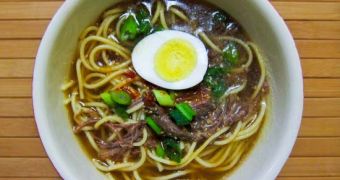During one of the latest meetings of the American Chemical Society, a team of researchers went public with the news that, when it comes to curing even the most vicious of hangovers, one big bowl of beef and noodle broth pretty much trumps all other remedies.
Before anyone reaches for the phone looking to order whatever beef and noodle soup is the first listed on a menu they happen to have lying around, it has to be said that the broth now said to cure hangovers is actually an Asian recipe.
Its official name is Yak-a-mein Soup (spellings such as Yakmein, Yaka-mein and Yak-a-Men are also used by some), yet most of the people who have had the chance to give it a try during their hour of need refer to it as Old Sober.
Specialists explain that this particular broth owes its ability to fight hangovers to its having a perfectly balanced mixture of salts, proteins, carbohydrates and micronutrients, all of which are precisely what one hangover-affected mind needs.
“Although recipes vary, Yak-a-mein typically is made with a salty beef-and-soy-sauce-based broth; a carbohydrate source like noodles; protein from beef, chicken or shrimp; onions or chopped scallions; and sliced hard-boiled egg,” reads the official website for the American Chemical Society.
Furthermore, “Vendors often sell the soup from sidewalk carts during New Orleans festivals, and some restaurants have their own signature recipes.”
By the looks of it, the people living in New Orleans are the ones who more often resort to this hangover cure.
Thus, it is being said that they developed a taste for Yak-a-mein Soup after local soldiers stationed in Korea back in the 1950s brought the recipe back home and taught their friends and relatives all about the perks of consuming this dish.
“Folklore has it that American soldiers from New Orleans stationed in Korea in the 1950s learned to appreciate Yak-a-mein on the morning after, and brought a taste for it back home.”
“It may be a good example of intuitive science — an effective remedy, and with the scientific basis revealed only years later,” specialist Alyson E. Mitchell, Ph.D explains.

 14 DAY TRIAL //
14 DAY TRIAL //